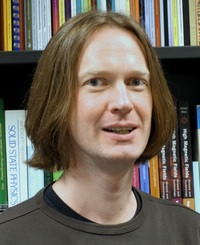Heusler compounds for magnetoelectronics and magnetocalori - Michael Nicklas (Max Planck Institute for Chemical Physics of Solids, Dresden, Allemagne)

Michael Nicklas, Max Planck Institute for Chemical Physics of Solids, Dresden, Allemagne
Abstract:
Experiments in high magnetic fields are essential for the understanding of the multi-functional properties found in Heusler alloys. We investigated the exchange-bias effect in Mn–Pt–Ga Heusler alloys in static and pulsed magnetic fields at the High-Magnetic Field Laboratories in Nijmegen and Dresden (HZDR). Our finding of an exceptionally high exchange-bias in a compensated ferrimagnet may lead to the development of magneto-electronic devices and rare earth-free exchange-biased hard magnets.1,2 Pulsed-field experiments, furthermore, permit us to study materials on fast time scales between 10 ms and 1s, which allowed us to probe Ni-Mn-In shape-memory Heusler alloys for the prospective use in magnetocaloric cooling devices. Our results show that the structural and magnetic contributions to the magnetocaloric effect as well as the irreversible behavior observed at the martensitic transition have to be carefully considered for future cooling applications.3,4
1A. K. Nayak, M. Nicklas, S. Chadov, C. Shekhar, Y. Skourski, J. Winterlik, and C. Felser, Phys. Rev. Lett. 110, 127204 (2013).
2A. K. Nayak, M. Nicklas, S. Chadov, P. Khuntia, C. Shekhar, A. Kalache, M. Baenitz, Y. Skourski, V. K. Guduru, A. Puri, U. Zeitler, J. M. D. Coey and C. Felser, Nature Mater. 14, 679 (2015).
3A. K. Nayak, C. Salazar Mejia, S. W. D’Souza, S. Chadov, Y. Skourski, C. Felser, and M. Nicklas, Phys. Rev. B 90, 220408(R) (2014).
4M. Ghorbani Zavareh, C. Salazar Mejía, A. K. Nayak, Y. Skourski, J. Wosnitza, C. Felser, and M. Nicklas, Appl. Phys. Lett. 106, 071904 (2015).
Prof. Nicklas' research web page
Cette conférence est présentée par le RQMP Versant Nord du Département de physique de l'Université de Montréal et le Département de génie physique de Polytechnique Montréal.
Emplacement : 2900, chemin de la Tour G-415 Montréal H3T 1J6 QC Canada